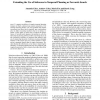510 search results - page 23 / 102 » How Should We Solve Search Problems Privately |
HEURISTICS
2010
13 years 2 months ago
2010
Operation management of underground passenger transport systems is associated with combinatorial optimization problems (known as crew and train scheduling and rostering) which bel...
AIPS
2009
13 years 8 months ago
2009
PDDL2.1 supports modelling of complex temporal planning domains in which solutions must exploit concurrency. Few existing temporal planners can solve problems that require concurr...
WWW
2009
ACM
14 years 8 months ago
2009
ACM
The ImpressionRank of a web page (or, more generally, of a web site) is the number of times users viewed the page while browsing search results. ImpressionRank captures the visibi...
SLS
2009
Springer
14 years 2 months ago
2009
Springer
Stochastic local search algorithms can now successfully solve MAXSAT problems with thousands of variables or more. A key to this success is how effectively the search can navigate...
AAAI
2010
13 years 9 months ago
2010
In cooperative pathfinding problems, non-interfering paths that bring each agent from its current state to its goal state must be planned for multiple agents. We present the first...


